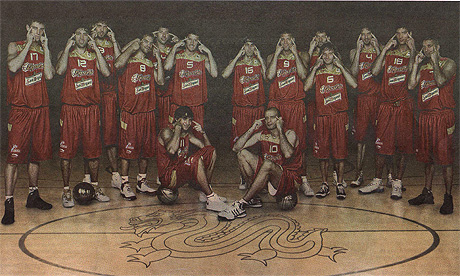The stadium-sized acceptance speech that Barack Obama gave tonight has been compared to those of FDR and JFK, but the note he struck by the speech's end reminded me of a Republican: Ronald Reagan.
Obama's Denver speech was a mirror image of Reagan's acceptance speech in 1980, in which the California governor called for an end to big government:
As your nominee, I pledge to restore to the federal government the capacity to do the people's work without dominating their lives. I pledge to you a government that will not only work well, but wisely; its ability to act tempered by prudence and its willingness to do good balanced by the knowledge that government is never more dangerous than when our desire to have it help us blinds us to its great power to harm us.
Reagan was riding a wave of popular protest against government waste and excess. Obama spoke tonight at a time when a lack of good government — from a crippled FEMA to shoddy bridge maintenance to unaffordable health care to unscrupulous military subcontractors — is the problem. Big government "harms," Reagan said, and to that Obama answered tonight: So does an impotent government.
Ours is a promise that says government cannot solve all our problems, but what it should do is that which we cannot do for ourselves — protect us from harm and provide every child a decent education; keep our water clean and our toys safe; invest in new schools and new roads and new science and technology.
Our government should work for us, not against us. It should help us, not hurt us. It should ensure opportunity not just for those with the most money and influence, but for every American who's willing to work.
(In his defense of government, Obama also channeled Roosevelt's "rendezvous with destiny" acceptance speech: "Better the occasional faults of a government that lives in a spirit of charity than the consistent omissions of a government frozen in the ice of its own indifference.")
Reagan's 1980 acceptance speech chastised the Carter administration for breaking the compact between elected leaders and the people, by betraying the values of the American people:
"Trust me" government asks that we concentrate our hopes and dreams on one man; that we trust him to do what's best for us. My view of government places trust not in one person or one party, but in those values that transcend persons and parties. The trust is where it belongs — in the people. The responsibility to live up to that trust is where it belongs, in their elected leaders. That kind of relationship, between the people and their elected leaders, is a special kind of compact.
Obama, too, talked of the disconnect between Washington's leaders and the American people, but he gave this sentiment a more populist slant. His candidacy, he declared, was about people rising up on behalf of a new politics — not placing their trust in a leader, but bringing about change themselves:
But I stand before you tonight because all across America something is stirring. What the nay-sayers don't understand is that this election has never been about me. It's been about you.
For eighteen long months, you have stood up, one by one, and said enough to the politics of the past. You understand that in this election, the greatest risk we can take is to try the same old politics with the same old players and expect a different result. You have shown what history teaches us — that at defining moments like this one, the change we need doesn't come from Washington. Change comes to Washington. Change happens because the American people demand it — because they rise up and insist on new ideas and new leadership, a new politics for a new time.
Reagan spoke of an "American spirit" that transcends the differences that divide Americans, that rests in hard work and love of freedom:
Tonight, let us dedicate ourselves to renewing the American compact. I ask you not simply to "Trust me," but to trust your values — our values — and to hold me responsible for living up to them. I ask you to trust that American spirit which knows no ethnic, religious, social, political, regional, or economic boundaries; the spirit that burned with zeal in the hearts of millions of immigrants from every corner of the Earth who came here in search of freedom.
Some say that spirit no longer exists. But I have seen it — I have felt it — all across the land; in the big cities, the small towns and in rural America. The American spirit is still there, ready to blaze into life if you and I are willing to do what has to be done; the practical, down-to-earth things that will stimulate our economy, increase productivity and put America back to work. The time is now to resolve that the basis of a firm and principled foreign policy is one that takes the world as it is and seeks to change it by leadership and example; not by harangue, harassment or wishful thinking.
Obama invoked again this "American spirit," this unifying creed built on the backs of immigrants, but he emphasized its moral and spiritual dimension, in Americans' constant striving toward the immaterial, the "unseen":
Instead, it is that American spirit — that American promise — that pushes us forward even when the path is uncertain; that binds us together in spite of our differences; that makes us fix our eye not on what is seen, but what is unseen, that better place around the bend.
That promise is our greatest inheritance. It's a promise I make to my daughters when I tuck them in at night, and a promise that you make to yours — a promise that has led immigrants to cross oceans and pioneers to travel west; a promise that led workers to picket lines, and women to reach for the ballot.
Finally, Obama's speech, like Reagan's, was a direct appeal to national unity, attempting to bridge an intensely partisan political landscape. Reagan, who as president would draw fierce criticism for policies hostile to minorities, reached out explicitly to them in his acceptance speech — "When those in leadership give us tax increases and tell us we must also do with less, have they thought about those who have always had less — especially the minorities?" He broadly appealed to "Democrats, Independents, and Republicans" with an optimistic message that combined the moral tenets of American liberalism and conversatism: compassion and personal responsibility, "the shared values of family, work, neighborhood, peace and freedom" — while making the conservative case that American could be more compassionate if government was less powerful.
Together, let us make this a new beginning. Let us make a commitment to care for the needy; to teach our children the values and the virtues handed down to us by our families; to have the courage to defend those values and the willingness to sacrifice for them.
Let us pledge to restore, in our time, the American spirit of voluntary service, of cooperation, of private and community initiative; a spirit that flows like a deep and mighty river through the history of our nation.
Obama, too, sought to downplay political differences, while making overtures to a segment of the electorate skeptical of Democrats: national security voters. "Patriotism has no party," he said. "Democrats and Republicans and Independents" fighting abroad "have not served a Red America or a Blue America — they have served the United States of America."
In a nod to conservatives, he spoke of the importance of both "individual responsibility and mutual responsibility" — even as his political purpose was to emphasize the latter, casting the moral imperative of compassion in biblical language:
That's the promise of America — the idea that we are responsible for ourselves, but that we also rise or fall as one nation; the fundamental belief that I am my brother's keeper; I am my sister's keeper.
"I believe that this generation of Americans today has a rendezvous with destiny," Reagan said in his 1980 speech, an explicit reference to FDR's 1936 convention speech. Now Obama has taken the rhetoric of Reagan and used it in the service of a diametrical vision of compassionate government and shared prosperity.
Obama has himself talked about how Reagan "changed the trajectory" of America, and it seems that Obama desires to lead a similar transformation of the country's politics — though in the opposite ideological direction. The echoes of Reagan in his acceptance speech suggest that he already has this goal in mind.
So, if the 2004 election was a repeat of the Goldwater-LBJ election, perhaps 2008 will be a replaying of the 1980 election: an unpopular president succeeded by a charismatic leader, who brings a new consensus to national politics. We will have to wait three months to see whether Obama has his rendezvous with destiny.
Victor Tan Chen Victor Tan Chen is In The Fray's editor in chief and the author of Cut Loose: Jobless and Hopeless in an Unfair Economy. Site: victortanchen.com | Facebook | Twitter: @victortanchen
- Follow us on Twitter: @inthefray
- Comment on stories or like us on Facebook
- Subscribe to our free email newsletter
- Send us your writing, photography, or artwork
- Republish our Creative Commons-licensed content






